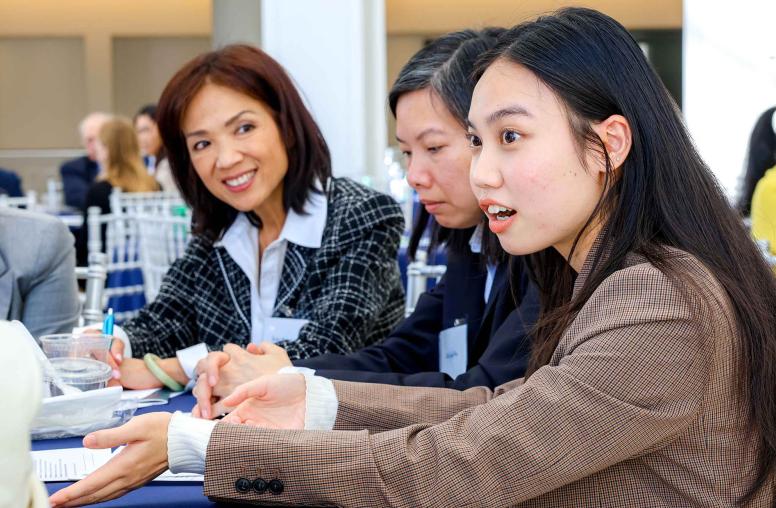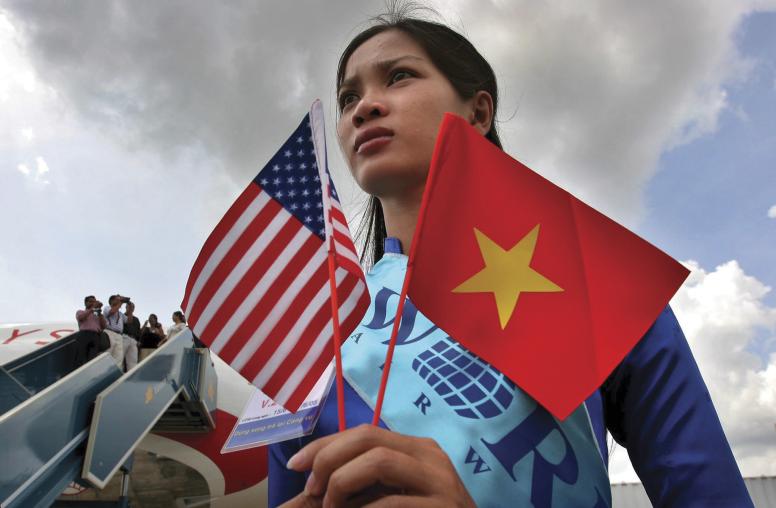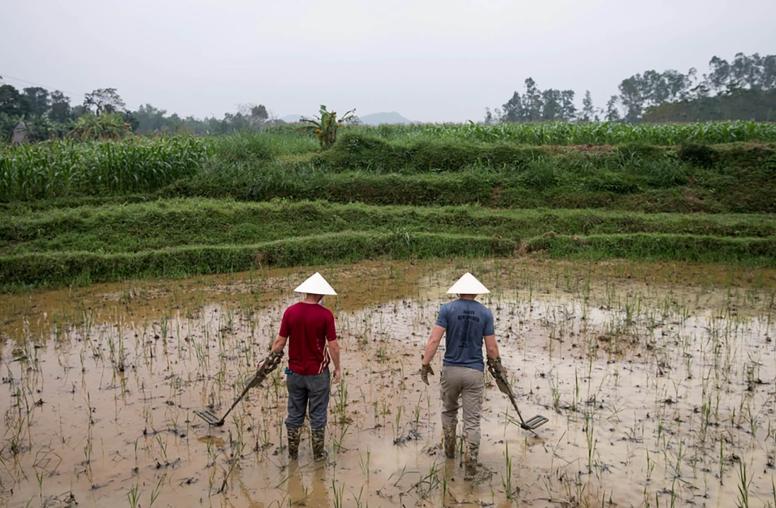Brian Harding on Defense Secretary Austin’s Trip to Vietnam
While cooperation on war legacy issues topped the agenda during U.S. Defense Secretary Austin’s recent trip to Vietnam, USIP’s Brian Harding says the deepening U.S-Vietnam relationship is, in part, meant “to balance what they’re concerned about on [Vietnam’s] northern border” with China.
On Peace is a weekly podcast sponsored by USIP and Sirius XM POTUS Ch. 124. After a brief hiatus, On Peace is available again on a weekly basis. Each week, USIP experts tackle the latest foreign policy issues from around the world.
Transcript
Julie Mason: Brian Harding is senior expert for Southeast Asia at the United States Institute of Peace. He tweets @IamBrianHarding. He's with me on Secretary Austin's trip to Southeast Asia last week and to talk about a new project that will be the focus of a discussion on Tuesday, August 3rd with Senator Leahy and several Vietnamese officials at the U.S. Institute of Peace.
Hi, Brian. Good morning.
Brian Harding: Morning. Good to be with you again.
Julie Mason: It's dispiriting that we're still dealing with the legacies of the Vietnam War.
Brian Harding: I mean, absolutely. And it is almost 50 years past us, but there's still a lot of work to do. I mean, the good news is that the United States has really come around and started to address these legacies of war. And really, Congress has been in the lead. As you mentioned, Senator Leahy will be with us at USIP tomorrow, and he's really been the driving force over the last several years, making sure that the United States is finally cleaning up Agent Orange and Da Nang, Bien Hoa, making sure that the United States continues to address the challenge of unexploded ordinance.
But it says a lot that when the Secretary of Defense Lloyd Austin made his first visit to Southeast Asia last week, he went to Vietnam and war legacies cooperation was at the centerpiece of it. It included one major piece of unfinished business, which is after decades of Vietnamese cooperation to help identify missing U.S. remains, the United States is finally doing something to help Vietnam identify their missing from the war. And so we're very excited to be supporting that effort at the U.S. Institute of Peace and starting tomorrow with a discussion with some senior Vietnamese officials as well as Senator Leahy and the U.S. government.
Julie Mason: And what's the point of that event? Like, what's the what's the gist?
Brian Harding: Well, we want to make sure that the United States public and the Vietnamese public know that this cooperation is happening. And you know, there's often a lot of attention to the strategic dynamics and promise of a closer U.S.-Vietnam partnership as it relates to China in the South China Sea, but ultimately, the U.S.-Vietnam relationship, which is an unbelievable arc, over the last 50 years, is built on trust-building and our shared history. And it's important that people know that these issues are still alive, they matter to families, there's hundreds of thousands of families in Vietnam who still don't know where their loved ones spent their last moments. So it's very important that the United States be engaged on this and really, it shows just how far we've come that the Department of Defense and the Vietnamese military are cooperating on what would have been very, very difficult issues, just pretty recently.
Julie Mason: Of course, from the U.S. perspective, it's not all philanthropy and goodwill, there is strategic intent behind this international bonhomie.
Brian Harding: Absolutely. And I think the U.S.-Vietnam relationship is increasingly important. And it goes both ways. So Southeast Asia sits at the heart of competition between the United States and China, in the Indo-Pacific, and I don't think there's any country in Southeast Asia is leaning more into their relationship with the United States than Vietnam. It's important to note that we're starting at a very low base. Trust is new. You're not seeing major U.S.-Vietnam military exercises. Vietnam is not using U.S. defense equipment at the levels that we would like to see, we know we're just getting started here. But at least from a strategic perspective, United States and Vietnam have an awful lot in common and we're making progress in developing that relationship.
Julie Mason: Brian, why is it in the interests of Vietnam to lean more into the relationship with the United States at the expense of China?
Brian Harding: So Vietnam and China share a border. Also worth noting that they fought a war on that border. Vietnam's latest war, and there have been many wars, was with China, a border skirmish that killed thousands of people in 1979. You know, and also, it's important to note the long arc of history here. China controlled Vietnam for about a thousand years, albeit 2,000 years ago, but for Vietnamese people, this is if it were yesterday, and ultimately, that concern, that worry about the giant neighbor from the north means that Vietnam wants to balance. During the Cold War, that meant a closer relationship with the Soviet Union despite the communist ties with Beijing. And right now, it means they want the United States but not just the United States, they want the Europeans and in now there's an increasingly important Vietnam-India relationship, Vietnam-Japan relationship. So Vietnam is looking to bring the rest of us into the region to balance what they're concerned about on the northern border.
Julie Mason: Brian, Secretary Austin also made a stop in the Philippines. And I wonder what you made of that and also the U.S. alliance with the Philippines and the problem of Duterte.
Brian Harding: Yeah, well, I mean, first thing I'd say is that it's very clear to the Pentagon that Southeast Asia is of increasing importance, again, because of competition with China. It's also worth saying Southeast Asia's 650 million people and a three trillion-dollar economy, a lot of reasons to care about Southeast Asia. But for a lot of reasons, the administration's engagement with Southeast Asia got off to a slow start. So Austin was the first cabinet secretary to make visits to the region, and he had a great trip. Part of that is because of where he traveled, also Singapore, learning into his relationship with U.S.-Vietnam as we were talking about and in the Philippines, where the United States has a treaty ally, and a mutual defense treaty, but a certainly a difficult political leader in President Duterte to deal with.
You also have a defense establishment that's looking to build a closer relationship with the United States. He came away with a commitment by President Duterte that we would not cancel the Visiting Forces Agreement, which really forms the legal basis that allows for U.S.-Philippines defense cooperation, ultimately would allow for the United States to defend the Philippines as we are committed to do under the mutual defense treaty. So Austin came away with a win by just keeping things stable. The U.S.-Philippines alliance has been on thin ice since Duterte came in 2016. And, in a lot of ways, by having the Visiting Forces Agreement and the alliance still intact on paper, more than five years later is a win and Austin had a great system visit there
Julie Mason: It seems he was a bit of a bit of a scout team for the vice president, who will be heading to the region in August, I believe. Well, we're in August, it is August. It's August. Woo.
Brian Harding: Yes, that's fantastic. I mean, no coincidence that she's also going to be visiting Singapore and Vietnam. She's going to have a great visit. You know, but I would say that we need to, certainly these are interesting countries with a lot of promise. But Southeast Asia is bigger than this. Indonesia, fourth biggest country in the world, really the regional heavyweight. I mean, the country is really reeling from COVID right now, so it's difficult to make a plan. So it's good to see Austin and the vice president heading out to the region, but Southeast Asia is a complicated place with lots of different countries. Thailand is another U.S. treaty ally, Malaysia is an important country, Indonesia. So hopefully we see more officials out there. I should also note that this week, Secretary Blinken will virtually be participating in five Southeast Asia-related summit meetings. Hopefully we'll see him on the road there sometime soon. And hopefully we'll see President Biden out in the region in November for the East Asia Summit in Brunei.
Julie Mason: Well, I hope you have a terrific event tomorrow, Brian, it sounds really good.
Brian Harding: Terrific. Thanks so much for having me.
Julie Mason: Thanks for joining me. Brian Harding is senior expert for Southeast Asia at the United States Institute of Peace. He tweets @IamBrianHarding.



